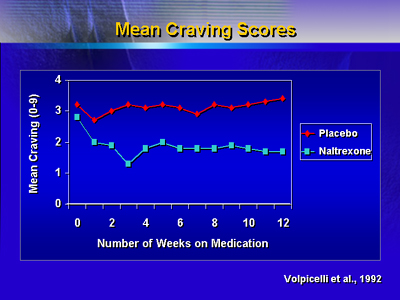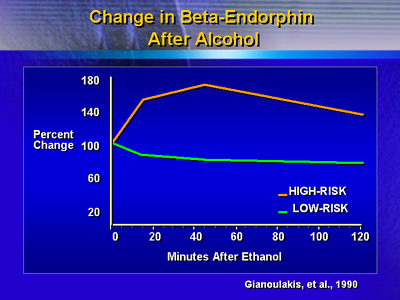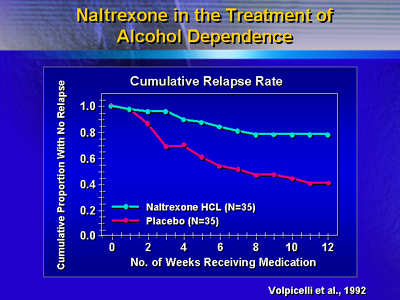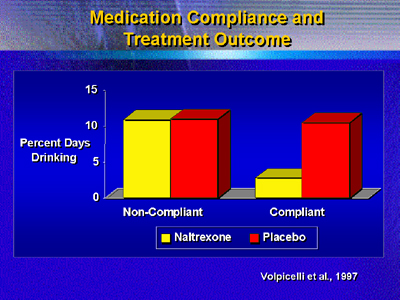|
Naltrexone is a safe and effective medication that decreases cravings for alcohol.
Patients who experience high initial levels of alcohol craving or a strong family history of alcoholism have better clinical outcomes when taking naltrexone. Successful naltrexone treatment depends on patients remaining compliant with treatment. Strategies to enhance compliance and treatment retention include standard psychosocial interventions and motivational enhancement techniques called BRENDA.
Naltrexone is a safe and effective medication that decreases the cravings for alcohol. Patient characteristics that are likely to have a positive response to naltrexone have been identified. For example, patients who experience high initial levels of alcohol craving or a strong family history of alcoholism have better clinical outcomes when taking naltrexone compared with similar placebo patients.

Dr. Volpicelli explained that people with a family history of alcoholism have an increased sensitivity to the pleasures of alcohol. Research shows these people have lower levels of plasma beta-endorphin compared to non-alcoholics. Upon drinking, plasma beta-endorphin levels of these people increase to the levels of non-alcoholics. This may provide a biological explanation for a genetic predisposition to alcohol.

Clinical research studies have typically used an oral dose of naltrexone of 50 mg per day. Recent studies show that higher doses (100 mg per day, 150 mg per day) of naltrexone are well tolerated. For reasons not fully understood, some patients respond better to higher doses of naltrexone. Dr. Volpicelli's data indicate the effects of naltrexone increase with long-term treatment. With treatment, alcoholics lose the craving for alcohol. When drinking occurs, the alcoholic euphoria is no longer present. Naltrexone may not be appropriate for people with low cravings for alcohol. These people benefit most from psychosocial interventions.

Results of clinical trials show that pharmacological treatment of alcoholism depends on patients remaining compliant with treatment. Some patients do not comply with treatment because of side effects. The primary side effects responsible for naltrexone noncompliance are nausea and vomiting.

Clinical research has suggested various strategies to optimize the effectiveness of naltrexone for alcoholism treatment. One strategy is to use compliance-enhancing techniques to improve medication adherence and treatment retention. Standard psychosocial interventions are very effective at improving medication adherence and treatment retention. To aid compliance, Dr. Volpicelli developed the BRENDA approach. BRENDA utilizes motivational enhancement techniques. Compliance and retention was greatly improved when a psychosocial program is combined with naltrexone treatment. Dr. Volpicelli remarked these techniques could easily be integrated into an office-based practice to improve compliance with pharmacotherapy.
|